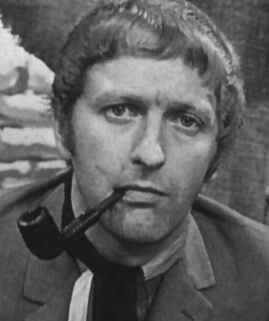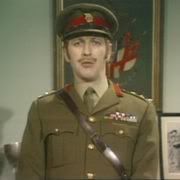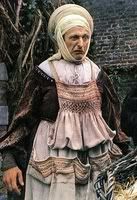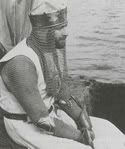Homage to Graham Chapman
Graham Chapman 8th January 1941 - 4th October 1989.
Graham Chapman was a British comedian and writer. He was one of the six Monty Python members and lead actor in their two narrative films playing King Arthur in Monty Python and the Holy Grail and Brian in Life of Brian.

In 1969 Chapman and Cleese joined Michael Palin, Terry Jones, Eric Idle and American artist Terry Gilliam for Monty Python's Flying Circus. Cleese and Chapman's classic Python sketches include "The Ministry of Silly Walks" and "Dead Parrot". One of Chapman's most famous characters was "The Colonel", a stuffy army officer who occasionally appeared out of nowhere to order the end of a sketch for being too silly. After Cleese left the series in 1973, Chapman wrote alone, as well as a bit with Neil Innes and Douglas Adams for the final fourth season. He then developed a number of television and movie projects, most notably Out of the Trees, The Odd Job and Yellowbeard, in which he starred alongside Cleese, Peter Cook, Cheech and Chong and Feldman.

In the late 1970s, Chapman moved to Los Angeles, where he guest-starred on many US television shows, including The Hollywood Squares, Still Crazy Like a Fox, and the NBC sketch series The Big Show (TV show). Upon returning to England he became involved with the Dangerous Sports Club (an extreme sportsclub which introduced bungee jumping to a wide audience), and he began the first of a lengthy series of US college lecture tours in the 1980s. His memoir, "A Liar's Autobiography", was published in 1980 and, unusually for an autobiography, had five authors: Chapman, his partner David Sherlock, Alex Martin, David Yallop and Douglas Adams, who in 1977 was virtually unknown as a recent graduate fresh from Cambridge. Adams was mentored by Chapman, but they later had a falling out and didn't speak for several years.

Among Chapman's best friends were Keith Moon of The Who, singer Harry Nilsson, and Beatle Ringo Starr. Chapman was an alcoholic in the 1970s, and he also kept his homosexuality a secret until the mid-70's (although his fellow Pythons were already aware) when he famously came out on a British chat show, one of the first celebrities to do so. Several days later, he came out to a group of friends at a party held at his home in Belsize Park where he officially introduced them to his partner, David Sherlock. Afterwards, he became a vocal spokesman on gay rights.

One of Michael Palin's favourite stories about Chapman involved Palin's trips to collect him every morning for Python-related business: he would call up to Chapman's window and be greeted by a collection of young men before Chapman eventually surfaced, pipe in mouth. After Chapman made his homosexuality public on a television show hosted by British jazz musician George Melly, a member of the public wrote to the Pythons to complain that she had heard a member of the team was a homosexual, continuing on to quote a Bible passage which said "he who lies with another man shall be taken out and killed." Idle sent a reply saying, "We've found out who he was and we've taken him out and killed him."

Chapman died at the age of 48 on 4 October 1989, of pneumonia brought about by the throat cancer which had spread to his spine. His death was one day before the 20th anniversary of the first broadcast of Flying Circus - in Jones' words, "the worst case of party-pooping in all history." Cleese delivered a eulogy for Chapman, during which he deliberately used the word "fuck" as well as other expletives, and got away with it on the BBC without having the bad language censored. Cleese's eulogy was so funny that it was noted that some people at the funeral "almost died laughing." Cleese has said that Chapman would have liked that. After the eulogy Cleese was joined by Gilliam, Idle, Jones, and Palin to sing "Always Look on the Bright Side of Life" from the film Monty Python's Life of Brian. Idle made the last comment on the tribute by requesting that "he would be the last person to say 'fuck'".

John Cleese's opening speech at the Chapman tribute, two months after Graham's death/
"Graham Chapman, co-author of the 'Parrot Sketch,' is no more.
He has ceased to be, bereft of life, he rests in peace, he has kicked the bucket, hopped the twig, bit the dust, snuffed it, breathed his last, and gone to meet the Great Head of Light Entertainment in the sky, and I guess that we're all thinking how sad it is that a man of such talent, such capability and kindness, of such intelligence should now be so suddenly spirited away at the age of only forty-eight, before he'd achieved many of the things of which he was capable, and before he'd had enough fun.
Well, I feel that I should say, "Nonsense. Good riddance to him, the freeloading bastard! I hope he fries. "
And the reason I think I should say this is, he would never forgive me if I didn't, if I threw away this opportunity to shock you all on his behalf. Anything for him but mindless good taste. I could hear him whispering in my ear last night as I was writing this:
"Alright, Cleese, you're very proud of being the first person to ever say 'shit' on television. If this service is really for me, just for starters, I want you to be the first person ever at a British memorial service to say 'fuck'!"
You see, the trouble is, I can't. If he were here with me now I would probably have the courage, because he always emboldened me. But the truth is, I lack his balls, his splendid defiance. And so I'll have to content myself instead with saying 'Betty Mardsen...'
But Bolder and less inhibited spirits than me follow today. Jones and Idle, Gilliam and Palin. Heaven knows what the next hour will bring in Graham's name. Trousers Dropping, blasphemers on pogo sticks, spectacular displays of high-speed farting, synchronised incest. One of the four is planning to stuff a dead ocelot and a 1922 Remington typewriter up his own arse to the sound of the second movement of Elgar's cello concerto. And that's in the first half.
Because you see, Gray would have wanted it this way. Really. Anything for him but mindless good taste. And that's what I'll always remember about him---apart, of course, from his Olympian extravagance. He was the prince of bad taste. He loved to shock. In fact, Gray, more than anyone I knew, embodied and symbolised all that was most offensive and juvenile in Monty Python. And his delight in shocking people led him on to greater and greater feats. I like to think of him as the pioneering beacon that beat the path along which fainter spirits could follow.
Some memories. I remember writing the undertaker speech with him, and him suggesting the punch line, 'All right, we'll eat her, but if you feel bad about it afterwards, we'll dig a grave and you can throw up into it.' I remember discovering in 1969, when we wrote every day at the flat where Connie Booth and I lived, that he'd recently discovered the game of printing four-letter words on neat little squares of paper, and then quietly placing them at strategic points around our flat, forcing Connie and me into frantic last minute paper chases whenever we were expecting important guests.
I remember him at BBC parties crawling around on all fours, rubbing himself affectionately against the legs of gray-suited executives, and delicately nibbling the more appetizing female calves. Mrs. Eric Morecambe remembers that too.
I remember his being invited to speak at the Oxford union, and entering the chamber dressed as a carrot---a full length orange tapering costume with a large, bright green sprig as a hat----and then, when his turn came to speak, refusing to do so. He just stood there, literally speechless, for twenty minutes, smiling beatifically. The only time in world history that a totally silent man has succeeded in inciting a riot.
I remember Graham receiving a Sun newspaper TV award from Reggie Maudling. Who else! And taking the trophy falling to the ground and crawling all the way back to his table, screaming loudly, as loudly as he could. And if you remember Gray, that was very loud indeed.
It is magnificent, isn't it? You see, the thing about shock... is not that it upsets some people, I think; I think that it gives others a momentary joy of liberation, as we realised in that instant that the social rules that constrict our lives so terribly are not actually very important.
Well, Gray can't do that for us anymore. He's gone. He is an ex-Chapman. All we have of him now is our memories. But it will be some time before they fade."

Graham Chapman was a British comedian and writer. He was one of the six Monty Python members and lead actor in their two narrative films playing King Arthur in Monty Python and the Holy Grail and Brian in Life of Brian.

In 1969 Chapman and Cleese joined Michael Palin, Terry Jones, Eric Idle and American artist Terry Gilliam for Monty Python's Flying Circus. Cleese and Chapman's classic Python sketches include "The Ministry of Silly Walks" and "Dead Parrot". One of Chapman's most famous characters was "The Colonel", a stuffy army officer who occasionally appeared out of nowhere to order the end of a sketch for being too silly. After Cleese left the series in 1973, Chapman wrote alone, as well as a bit with Neil Innes and Douglas Adams for the final fourth season. He then developed a number of television and movie projects, most notably Out of the Trees, The Odd Job and Yellowbeard, in which he starred alongside Cleese, Peter Cook, Cheech and Chong and Feldman.

In the late 1970s, Chapman moved to Los Angeles, where he guest-starred on many US television shows, including The Hollywood Squares, Still Crazy Like a Fox, and the NBC sketch series The Big Show (TV show). Upon returning to England he became involved with the Dangerous Sports Club (an extreme sportsclub which introduced bungee jumping to a wide audience), and he began the first of a lengthy series of US college lecture tours in the 1980s. His memoir, "A Liar's Autobiography", was published in 1980 and, unusually for an autobiography, had five authors: Chapman, his partner David Sherlock, Alex Martin, David Yallop and Douglas Adams, who in 1977 was virtually unknown as a recent graduate fresh from Cambridge. Adams was mentored by Chapman, but they later had a falling out and didn't speak for several years.

Among Chapman's best friends were Keith Moon of The Who, singer Harry Nilsson, and Beatle Ringo Starr. Chapman was an alcoholic in the 1970s, and he also kept his homosexuality a secret until the mid-70's (although his fellow Pythons were already aware) when he famously came out on a British chat show, one of the first celebrities to do so. Several days later, he came out to a group of friends at a party held at his home in Belsize Park where he officially introduced them to his partner, David Sherlock. Afterwards, he became a vocal spokesman on gay rights.

One of Michael Palin's favourite stories about Chapman involved Palin's trips to collect him every morning for Python-related business: he would call up to Chapman's window and be greeted by a collection of young men before Chapman eventually surfaced, pipe in mouth. After Chapman made his homosexuality public on a television show hosted by British jazz musician George Melly, a member of the public wrote to the Pythons to complain that she had heard a member of the team was a homosexual, continuing on to quote a Bible passage which said "he who lies with another man shall be taken out and killed." Idle sent a reply saying, "We've found out who he was and we've taken him out and killed him."

Chapman died at the age of 48 on 4 October 1989, of pneumonia brought about by the throat cancer which had spread to his spine. His death was one day before the 20th anniversary of the first broadcast of Flying Circus - in Jones' words, "the worst case of party-pooping in all history." Cleese delivered a eulogy for Chapman, during which he deliberately used the word "fuck" as well as other expletives, and got away with it on the BBC without having the bad language censored. Cleese's eulogy was so funny that it was noted that some people at the funeral "almost died laughing." Cleese has said that Chapman would have liked that. After the eulogy Cleese was joined by Gilliam, Idle, Jones, and Palin to sing "Always Look on the Bright Side of Life" from the film Monty Python's Life of Brian. Idle made the last comment on the tribute by requesting that "he would be the last person to say 'fuck'".

John Cleese's opening speech at the Chapman tribute, two months after Graham's death/
"Graham Chapman, co-author of the 'Parrot Sketch,' is no more.
He has ceased to be, bereft of life, he rests in peace, he has kicked the bucket, hopped the twig, bit the dust, snuffed it, breathed his last, and gone to meet the Great Head of Light Entertainment in the sky, and I guess that we're all thinking how sad it is that a man of such talent, such capability and kindness, of such intelligence should now be so suddenly spirited away at the age of only forty-eight, before he'd achieved many of the things of which he was capable, and before he'd had enough fun.
Well, I feel that I should say, "Nonsense. Good riddance to him, the freeloading bastard! I hope he fries. "
And the reason I think I should say this is, he would never forgive me if I didn't, if I threw away this opportunity to shock you all on his behalf. Anything for him but mindless good taste. I could hear him whispering in my ear last night as I was writing this:
"Alright, Cleese, you're very proud of being the first person to ever say 'shit' on television. If this service is really for me, just for starters, I want you to be the first person ever at a British memorial service to say 'fuck'!"
You see, the trouble is, I can't. If he were here with me now I would probably have the courage, because he always emboldened me. But the truth is, I lack his balls, his splendid defiance. And so I'll have to content myself instead with saying 'Betty Mardsen...'
But Bolder and less inhibited spirits than me follow today. Jones and Idle, Gilliam and Palin. Heaven knows what the next hour will bring in Graham's name. Trousers Dropping, blasphemers on pogo sticks, spectacular displays of high-speed farting, synchronised incest. One of the four is planning to stuff a dead ocelot and a 1922 Remington typewriter up his own arse to the sound of the second movement of Elgar's cello concerto. And that's in the first half.
Because you see, Gray would have wanted it this way. Really. Anything for him but mindless good taste. And that's what I'll always remember about him---apart, of course, from his Olympian extravagance. He was the prince of bad taste. He loved to shock. In fact, Gray, more than anyone I knew, embodied and symbolised all that was most offensive and juvenile in Monty Python. And his delight in shocking people led him on to greater and greater feats. I like to think of him as the pioneering beacon that beat the path along which fainter spirits could follow.
Some memories. I remember writing the undertaker speech with him, and him suggesting the punch line, 'All right, we'll eat her, but if you feel bad about it afterwards, we'll dig a grave and you can throw up into it.' I remember discovering in 1969, when we wrote every day at the flat where Connie Booth and I lived, that he'd recently discovered the game of printing four-letter words on neat little squares of paper, and then quietly placing them at strategic points around our flat, forcing Connie and me into frantic last minute paper chases whenever we were expecting important guests.
I remember him at BBC parties crawling around on all fours, rubbing himself affectionately against the legs of gray-suited executives, and delicately nibbling the more appetizing female calves. Mrs. Eric Morecambe remembers that too.
I remember his being invited to speak at the Oxford union, and entering the chamber dressed as a carrot---a full length orange tapering costume with a large, bright green sprig as a hat----and then, when his turn came to speak, refusing to do so. He just stood there, literally speechless, for twenty minutes, smiling beatifically. The only time in world history that a totally silent man has succeeded in inciting a riot.
I remember Graham receiving a Sun newspaper TV award from Reggie Maudling. Who else! And taking the trophy falling to the ground and crawling all the way back to his table, screaming loudly, as loudly as he could. And if you remember Gray, that was very loud indeed.
It is magnificent, isn't it? You see, the thing about shock... is not that it upsets some people, I think; I think that it gives others a momentary joy of liberation, as we realised in that instant that the social rules that constrict our lives so terribly are not actually very important.
Well, Gray can't do that for us anymore. He's gone. He is an ex-Chapman. All we have of him now is our memories. But it will be some time before they fade."
